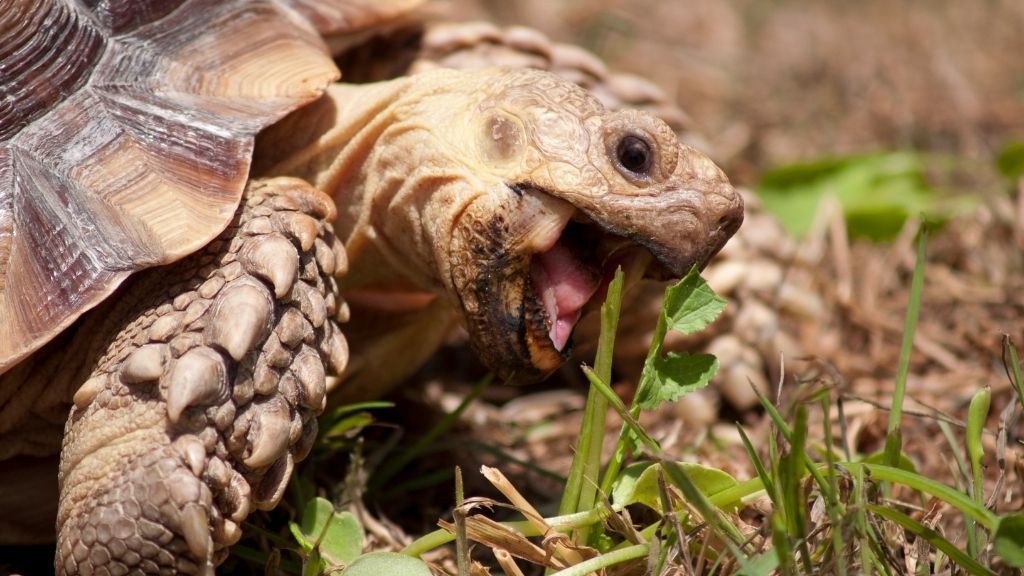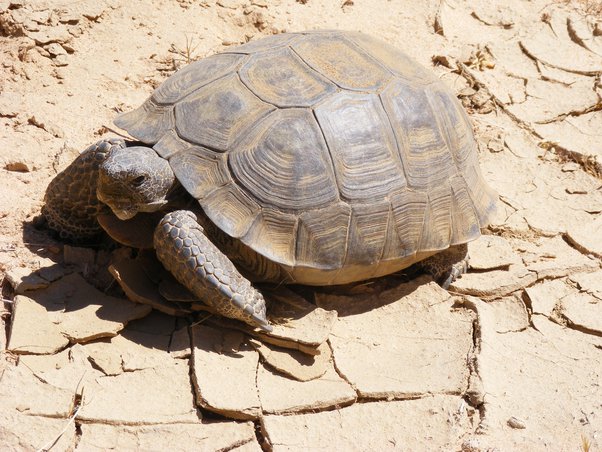How Long Can A Tortoise Go Without Food? Keep Pets Safe & Active!
How long can a tortoise go without food? Considering age, species, and habitat, tortoises can go 3 months to 3 years without food.
Due to the storage of food fat, tortoises can supply the required energy for months. Besides, the low temperature triggers to store energy and enter hibernation when the temperature gets under 45° F. In this period, they can survive up to years without any supplies. But they require a water source as tortoises become dehydrated quickly.
Confused about the tortoise survival mechanism? Scroll through our guide for detailed factors and maintain proper feeding for babies and adults!
How Long Can A Tortoise Go Without Food?

Depending on the age, species, habitat temperature, and physical condition, tortoises can go 3 months to 3 years without food. Let’s dig into these factors in detail.
Tortoise Age
Baby tortoise is developing rapidly and requires a continuous food supply for proper growth. If they don’t get regular food, the digestive mechanism fails quickly. As a result, the babies can’t go more than a week without a proper diet.
On the other hand, the adult tortoise has enough body fat to supply energy for months. Even the metabolism of adults is slow and requires fewer food supplies. Hence, they can easily survive 3 months to a year without food.
Tortoise Species
Considering the habitat, ecosystem, and dietary habits, most species can survive up to 3 months, whereas few can go more than a year without supplies.
As per TurtleHub, species like Testudo hermanni are comparatively small size tortoises. Due to their size, Hermanis require small food supplies and survive up to 3 months. On the contrary, desert tortoise species like Gopherus agassizii live in harsh desert weather. Because of their extreme survival capabilities, these species can go 2-3 years without food.
Habitat Temperature
The metabolism rate of the tortoise becomes slow with a decrease in habitat temperature. In fact, tortoises become inactive and enter the hibernating phase in cold temperatures. During this phase, they require only a few calories and cover the total requirement using fat.
If the habitat temperature is below 60° F, the tortoise starts to store energy. Then, they enter hibernation when the temperature gets under 45° F. Hence, tortoise only requires water to survive for months. To keep your pet alive while going out for 6 months to a year, we suggest maintaining the temperature correctly.
Physical Condition
While it’s about survival capabilities, the physical condition of the tortoise matters a lot. If the tortoise is healthy and fit, it can survive for over a year. But a weak or ill tortoise can’t make such a long way without supplies. Also, check out the health status before putting a tortoise through hibernation.
How Long Can Tortoises Go Without Water?

Most tortoises species become dehydrated quickly and only survive up to a week without water. Initially, dehydration causes damage to the kidney. Within 2 to 3 days, the kidney starts to malfunction, which results in appetite loss.
Moreover, extreme dehydration offers signs like a pale face, dry skin, and whitish urine. If it continues, tortoises lose weight and can’t survive more than a week. On the flip side, few desert species require a water supply once a month. Even these species get the required water content from the food. Hence, these species can survive months without water.
How Often Should I Feed My Tortoise?
Baby tortoise requires to feed once daily, whereas adult one requires a feeding schedule of 3 days a week.
According to Totoiseowner, the developing immunity and digestive system of baby tortoises require regular feeding for proper growth. From hatching to the first year, the baby tortoise must feed once daily. Otherwise, the digestive mechanism fails quickly, and babies can’t survive a week without a proper diet.
But adult tortoise has a developed digestive system with fat storage. If you feed them daily, it increases their weight rapidly, which causes severe health risks. As a result, always maintain 3 days weekly feeding pattern for adults. Also, it is better to offer a variety of diets to keep adults healthy and active.
Can I Leave My Tortoise For A Week?
Yes, tortoises can survive without food but require a source of water while on vacation for a week.
When going out for a week, tortoises can survive easily without a food supply. Even adult tortoises use body fat to supply energy for over a month. That is why don’t worry about the food supply while going out for one or two weeks.
But, keep sure the water source is available as the tortoise becomes dehydrated in 2-3 days, which causes severe damage to the kidney. Only desert species require a water supply once a month. Otherwise, always provide a clean source of water before going out.
What To Do While Leaving The Tortoise For Vacation
Before going out for a vacation, install an automatic feeder or hire a tortoise sitter to keep your pets safe. Let’s go through these ways in detail.
Install Automatic Feerder
If you’re planning a vacation, an automatic food dispenser can save tortoises. It comes with a food chamber and operates with a fixed schedule. Set the dispenser according to the feeding schedule to keep tortoises safe and healthy. Also, keep enough source of fresh water to save pets from dehydration.
Hire Tortoise Sitter
If the vacation is more than a month, an automatic food dispenser won’t work for your pets. ExoticDirect suggests hiring professional tortoise sitters to ensure proper care. But check the customer review before picking a professional tortoise sitter.
Final Thoughts
Tortoises can survive 3 months to 3 years without food, depending on the age, species, and habitat. But they require water regularly as tortoises become dehydrated quickly. Only a few desert species can survive once a month without water.
If you want to keep tortoises healthy, feed babies once daily and adults 3 days a week. While going out for vacation, install an automatic feeder or hire a tortoise sitter to maintain proper feeding patterns and keep pets healthy & active.
